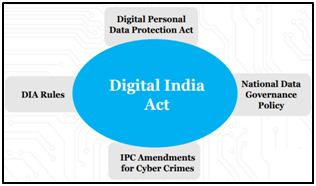Digital India Bill
15-11-2023
10:53 AM
1 min read

What’s in Today’s Article?
- Why in News?
- Need for the Digital India Bill
- Key Provisions of the Digital India Bill
- Significance of the Digital India Bill
- The Challenges to Implementing Digital India Bill
- News Summary Regarding Centre’s Plan to Access Anonymised Data of Big Tech Firms

Why in News?
- Under the upcoming Digital India Bill, the Centre (MeitY) is considering issuing a directive to big tech companies like Facebook, Google and Amazon to share anonymised personal data in their possession with a government-backed database.
Need for the Digital India Bill
- The Bill will replace the two decade old Information Technology Act 2000 (IT Act).
- The IT Act was crafted during a time when the internet was in its infancy, and has struggled to keep pace with the rapid changes in technology and user behaviour.
- Since its inception, India’s internet user base has exploded from a mere 5.5 million to a staggering 850 million.
- The nature of internet usage has also evolved, with the emergence of various intermediaries and the proliferation of new forms of user harm, such as cyberstalking, trolling and doxing.
- The Bill recognises these changes and aims to provide a comprehensive legal framework to address them.
- It is designed to address the challenges and opportunities presented by the dramatic growth of the internet and emerging technologies.
- The primary motivation behind the Bill is to bring India’s regulatory landscape in sync with the digital revolution of the 21st century.
Key Provisions of the Digital India Bill
- The Bill is a key part of a comprehensive legal framework which encompasses various legislative measures such as
- The recently-notified Digital Personal Data Protection Act 2023
- The draft Indian Telecommunication Bill 2022, and
- A policy addressing the governance of non-personal data.
- The Bill places a strong emphasis on online safety and trust, with a commitment to safeguarding citizen’s rights in the digital realm while remaining adaptable to shifting market dynamics and international legal principles.
- It recognises the growing importance of new age technologies such as artificial intelligence (AI) and blockchain and provides guidelines for their responsible utilisation.
- It upholds the concept of an open internet, striking a balance between accessibility and necessary regulations to maintain order and protect users.
- It mandates stringent Know Your Customer (KYC) requirements for wearable devices, accompanied by criminal law sanctions.
- It contemplates a review of the “safe harbour” principle, which presently shields online platforms from liability related to user generated content, indicating a potential shift in online accountability standards.
Significance of the Digital India Bill
- The provisions underscore the proposed Bill’s commitment in addressing the complexities of the digital age.
- It aims to not only encourage the adoption of the new age technologies but also to ensure that their deployment is in line with ethical-legal principles, data privacy principles and mechanisms for accountability.
- This means that the Bill does not just leave it to the market to dictate the course of these technologies but actively engages in shaping their development and use within a regulatory framework.
- And by doing so, the Bill strikes a balance between fostering innovation and safeguarding against potential harms.
- This forward-looking stance is not only beneficial for citizens and businesses but also positions India as a responsible player in the global technology landscape - harnessing the full potential of new age technologies while mitigating associated risks.
The Challenges to Implementing Digital India Bill
- Potential impact on innovation and the ease of doing business: Stricter regulations, particularly in emerging technologies, could inadvertently stifle entrepreneurial initiatives and deter foreign investments.
- The review of the “safe harbour” principle: It could lead to a more cautious approach among these platforms, possibly impinging on freedom of expression.
- Challenges to effective enforcement: This will require substantial resources, expertise, and infrastructure.
- Balancing the interests of various stakeholders: Including tech giants, while ensuring the protection of citizen rights, poses a significant challenge.
News Summary Regarding Centre’s Plan to Access Anonymised Data of Big Tech Firms
- In its most basic form, anonymised personal data/ non-personal data is any data set that does not contain personally identifiable information.
- It could include aggregated information, such as the overall health data of a particular demography, weather and climate data of an area, and traffic data, etc.
- Under the upcoming Digital India Bill, the IT Ministry is understood to have added a provision which will mandate big tech companies to deposit all the non-personal data they hold to the India datasets platform.
- The move, if finalised, could see these companies claim intellectual property rights over such data, and initiate discussions around the ownership of such data.
- The government has long been interested in this issue since such datasets form the bedrock of artificial intelligence (AI) models in India by providing a “robust foundation” for data-driven innovation and development.
- Non-personal data held by the Indian datasets platform could also be monetised.
- The Centre’s idea is that big tech companies have reaped dividends by building algorithms on the basis of Indians’ non-personal data, and that they cannot claim exclusive ownership over it.
Q1) Why was the Digital Personal Data Protection Act 2023 enacted?
The Digital Personal Data Protection Act 2023 seeks to empower individuals to take control of their personal data and to support organisations with their lawful processing of personal data.
Q2) What is the purpose of the draft Indian Telecommunication Bill 2022?
The Indian Telecommunication Bill 2022 provides that the central government will have exclusive privilege over establishing telecommunication networks and providing telecommunication services. The central government may issue a licence for these activities to private persons.
Source: Centre considers seeking access to anonymised data of big tech firms


